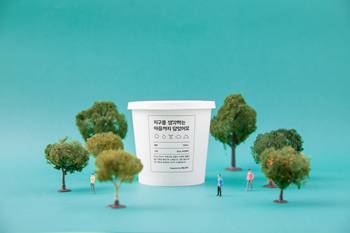
Across the nation, more people are choosing to stay at home due to their fear of the fast-spreading coronavirus, and with the country’s Crisis Alert level elevated to its highest level. This caused a dramatic spike in food deliveries leading to what some call a serious environmental issue, as the central government and local governments temporarily lifted bans on disposable products.
Jang Wook, the department head at Korea Plastic Packaging Container Association (KPPC), says that government policy is not the only reason for the rise in disposable products usage.
“It is true that the increase of using disposable products stems from the change in the government’s policy, but fundamentally, it should be viewed from the aspect that people are choosing disposable products voluntarily for good hygiene,” Jang said.
According to the Ministry of Environment, the amount of raw materials from PET recycling companies decreased by 46 percent from 16,855 tons to 9,116 tons monthly from January to March. Jang mentioned that this statistic illustrates the negative impact of delivery services as it leads to a decline in the price competitiveness of recycled materials. As the quality of recycled products are relatively low, companies will only choose them if the costs are low compared to the raw materials of non-recycled packaging.
“When there is no difference in prices between recycled and raw materials, it is no longer necessary to use the recycled ones,” Jang explained. “Since the international oil prices fell following the COVID-19 outbreak, raw material prices lowered, which decreased the price gap between raw materials and the recycled ones. This resulted in decreasing the demand for recycled products, making it harder for recycling industries to collect delivery waste.”
One method proposed in an attempt to solve the delivery waste problem is container standardization which addresses container thickness minimization and material unification. KPPC in collaboration with the Ministry of Environment, the Korea Zero Waste Movement Network (KZWMN), Korea Franchise Association (KFA), and the Woowa Brothers Corporation pushed policy on May 29 in order to reduce the amount of plastic used for delivery containers by up to 20 percent.
Along with growing environmental awareness, the public voiced a method that could solve delivery waste issues using eco-friendly materials. Packaging materials made from rice bran has been suggested. Rice bran generated during the rice-polishing process is normally thrown out, but it can be used to produce decomposable delivery containers.
However, Na Hae-ran, a researcher at KZWMN, says that eco-friendly packages will not make a difference if people use them once and throw them away.
“Eco-friendly products are not completely decomposed when they are buried,” Na said. “Thus, it is necessary to revitalize the multi-use container rental system industry rather than to use eco-friendly containers. Local governments should consider the safety of citizens as top priority, and relieve the citizens' anxiety about using multi-use containers through disinfection and frequent safety management inspections in food service industries. In addition, excavating multi-use container rental industries also contributes to job creation.”
According to Jang, it is no longer possible to solve environmental problems with government regulations alone. He commented that as the government attempted to reduce plastics usage, new industries continued to appear, and the number of applied packaging items increased.
“Instead, the government should work on methods to promote plastic recycling,” Jang said. “Social problems caused by infectious diseases are likely to occur continuously, and therefore it is crucial to be aware of the fact that the environment and national hygiene are compatible.”

